14 Questions for David Barr Kirtley
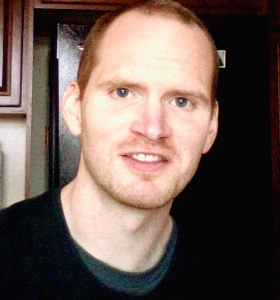 Nowadays, most anyone who’s into science fiction and fantasy will know Dave Kirtley, half of the team that hosts The Geek’s Guide to the Galaxy. What I bet a lot of people don’t know is that he has copied GAME OF THRONES, word for word, by hand, to learn about style and sentence structure, or that he’s also a talented artist who wants to help other up and coming artists get exposure. When I first met him, he was still a newly minted Asimov Award winner (the award has since been renamed the Dell Award), soft spoken, and curious about how I’d fallen in with such a motley crew of critique groupmates. I think we spent most of that first conversation talking about George R.R. Martin, because back then I was the cool person who knew George and Dave hadn’t even met him. I even introduced Dave to George at TorCon during a wild party thrown by the Brotherhood Without Banners. And when I say wild, I mean really full of people in odd costumes (okay, fine, by con standards, not wild). George was sitting in the back of the room by himself because none of his fans were brave enough to try to talk to him.
Nowadays, most anyone who’s into science fiction and fantasy will know Dave Kirtley, half of the team that hosts The Geek’s Guide to the Galaxy. What I bet a lot of people don’t know is that he has copied GAME OF THRONES, word for word, by hand, to learn about style and sentence structure, or that he’s also a talented artist who wants to help other up and coming artists get exposure. When I first met him, he was still a newly minted Asimov Award winner (the award has since been renamed the Dell Award), soft spoken, and curious about how I’d fallen in with such a motley crew of critique groupmates. I think we spent most of that first conversation talking about George R.R. Martin, because back then I was the cool person who knew George and Dave hadn’t even met him. I even introduced Dave to George at TorCon during a wild party thrown by the Brotherhood Without Banners. And when I say wild, I mean really full of people in odd costumes (okay, fine, by con standards, not wild). George was sitting in the back of the room by himself because none of his fans were brave enough to try to talk to him.
And now, how times have changed. Dave’s the one with all the cool friends and contacts, but he agreed to let me interview him, either because he’s really nice (he seems that way, at least, though soft spoken people can be sneaky about that) or because he thinks I set up that first meeting with George R.R. Martin that led to us having his full attention for most of the rest of the party. I didn’t hesitate to wonder, just sent him interview questions before he could change his mind.
Interview with David Barr Kirtley
Conducted and edited by Emily Mah, January 2012
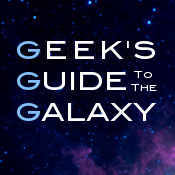 Everyone should know io9, but that doesn’t mean everyone does. Could you give our readers a thumbnail sketch of this site and why it’s where you podcast?
Everyone should know io9, but that doesn’t mean everyone does. Could you give our readers a thumbnail sketch of this site and why it’s where you podcast?
io9 is a science fiction and futurism blog run out of San Francisco by Annalee Newitz and Charlie Jane Anders. It’s part of Gawker Media, which also owns sites such as Kotaku, Gizmodo, and Jezebel. As far as I’m aware, io9 is the internet’s most popular science fiction site. It gets over three million visitors a month, and was named by The Times as one of the internet’s top science blogs. The Geek’s Guide to the Galaxy has been on io9 since October 2010, after they heard some of our early episodes and offered to host us. Obviously it’s a huge advantage to be affiliated with such a prominent site, as it’s greatly boosted the number of listeners we can reach, and enabled us to interview high-profile guests such as Richard Dawkins and Simon Pegg that we probably couldn’t get otherwise.
Can you tell us a little about your podcast, Geek’s Guide to the Galaxy?
It’s a talk show that comes out twice a month. Each episode is about an hour long, and features an interview followed by a discussion. Our guests are mostly fantasy & science fiction authors, but we’ve also interviewed filmmakers, game designers, and science writers. My co-host is John Joseph Adams, publisher of Lightspeed magazine and editor of a string of popular anthologies such as WASTELANDS and THE LIVING DEAD. Our discussions have included topics such as “Dungeons & Dragons,” “Nerd-Bashing,” “Horror in Outer Space,” “Are We Living in a Computer Simulation?,” and “Africa in Fantasy & Science Fiction.” Recently we’ve been bringing in “guest geeks” to join us for the discussions. Mostly these are old friends of ours who have some sort of expertise in the subject area. For example, we brought in Doug Cohen, editor of Realms of Fantasy magazine, to help us talk about A DANCE WITH DRAGONS by George R. R. Martin.
What’s been your favorite episode of Geek’s Guide so far?
Back in Episode 19, John Joseph Adams and I had a discussion about consciousness transference that I think is still the high point of the show. Consciousness is such a strange thing to think about, and it raises all sorts of questions when you start asking whether you could copy it into a computer or teleport it to a distant planet. You have to start asking: Is there a soul, and could you build a machine to transfer it from one brain to another? And how much of your brain can you alter and have it still be you? I think all our discussions have been fun and interesting, but that one was the most thoughtful and philosophical. That was actually the segment that first brought us to the attention of io9.
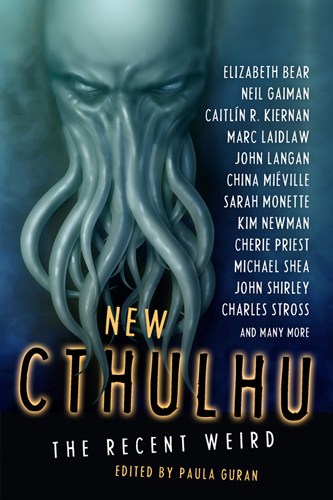 Have you met anyone through Geek’s Guide whom you’d always wanted to meet?
Have you met anyone through Geek’s Guide whom you’d always wanted to meet?
Yeah, definitely, though many of the fantasy & science fiction authors I grew up wanting to meet, such as George R. R. Martin or Orson Scott Card, I’d already met through workshops and conventions before I started doing the podcast. Probably the person I was most excited to talk to for the first time was Ron Gilbert, who designed my all-time favorite video game, The Secret of Monkey Island, which came out when I was about thirteen. One problem with meeting your childhood heroes is that by the time you get to interview them they’re usually a little sick of talking about stuff they did twenty years ago, but Ron definitely provided funny, thoughtful responses to all my reminiscing.
What’s been your funniest podcast, intentionally or unintentionally?
I think the funniest one is definitely Episode 5, where we interview Brian Dunning of the Skeptoid podcast. Skeptoid takes a critical look at dubious claims such as UFOs and Bigfoot. Some of the topics he’s covered are so outlandish as to be pretty hilarious, such as the belief that the world is secretly ruled by a cabal of extraterrestrial cave-dwelling lizard men. Most of our interview with him is basically just a greatest hits compilation of bizarre claims that have appeared on his show.
How about your most nervewracking podcast?
I was definitely most intimidated to talk to George R. R. Martin and Richard Dawkins, because those were two of our biggest guests, and also two people that I’m a huge fan of. The other really nerve-wracking thing is technical problems. Every time you listen to an audio interview, the interviewer always says, “We had some technical problems, so I apologize for the maddening background hiss” or “We had some technical problems, so I had to record this whole interview over from the beginning.” Whenever I would hear that, I would always think to myself, “Man, what an idiot. How hard is it to just record an interview?” Then I started doing interviews myself. You just would not believe how dicey it is recording audio, especially over the internet. The worst example of that was when we interviewed Ellen Kushner. We asked her our first question, and then instantly the internet went down. When we finally got her back on, we discovered that she’d given a ten minute answer before realizing that we weren’t there anymore. So that was pretty nerve-wracking. And sometimes things will start off fine, and then all of a sudden the internet speed will plummet dramatically, introducing this weird distortion into the guest’s voice. That happened during our interview with Neil deGrasse Tyson. He has this great anecdote about his feud with James Cameron, but some of his words were so garbled that it was hard to know what he was saying. I spent days editing it, and finally managed to reconstruct a lot of what he’d said by pasting in snippets from elsewhere in the interview.
Are there any other anecdotes you want to share, from behind the scenes of Geek’s Guide?
The internet at my house is really crummy. It went totally dead for about forty minutes in the middle of our Holly Black interview, and John had to finish up that interview himself. After that I started doing all the recording over at my grandmother’s house, since her internet is a lot more reliable than mine. So one time I drove over there, and as I’m pulling into the driveway I glance around the car and don’t see my laptop anywhere. Oh man, I think, I walked out the door without picking it up. I can picture exactly where I left it too, on the kitchen table. So I drive all the way back to my house, berating myself for being so careless. I jog into the house, and the kitchen table is … empty. What the heck, I’m sure I left it there. I search the rest of the house, can’t find it anywhere. Finally I go back out to the car, and there it is in the back seat, under a spiral notebook. So then I drive back to grandma’s house, berating myself the whole way again for making this completely pointless hour-long round trip. I made it back for the interview with just minutes to spare. So now whenever I head over there I make extra, extra sure that I’ve got my laptop, microphone, and earbuds with me.
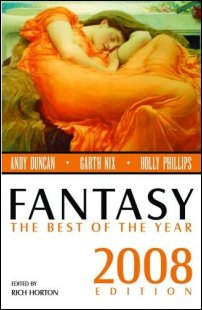 Aside from your podcasting, you’ve of course got your writing career. How do you divide your time currently, between your various projects and workshop appearances?
Aside from your podcasting, you’ve of course got your writing career. How do you divide your time currently, between your various projects and workshop appearances?
My only workshop appearance these days is I spend a week each summer teaching at the Alpha young writers’ workshop in Pittsburgh. Other than that, the podcast takes up most of my time. Editing audio is extremely time-consuming, more so than I ever would have imagined, but it makes sense when you think about it. Making an editing pass through a one-hour podcast is going to take, at minimum, one hour, and probably more like two or three, if you’re making any significant changes. Make five or six passes at that rate and you’re talking whole days spent at the computer. (Plus we usually start with about two hours of material and edit it down to one.) Then of course there’s prepping for the interviews. I try to read the guest’s latest book, and listen to any other audio interviews they’ve done in the past few years. Especially when you’re going to be on the phone with someone like Richard Dawkins, it can be hard to ever feel that you’re adequately prepared. So the fiction writing has definitely taken a back seat to the podcast this past year. Mostly I’ve just carved out time for short stories when John Joseph Adams specifically asks me to submit something to one of his anthologies.
I remember you always taking a very methodical approach to writing. You cultivate your talent through detailed analysis of other writers with methods that include copying novels by hand and diagramming out plots and subplots. Care to choose either of these or another such method and talk about what you’ve gained from it?
When I attended the Odyssey writing workshop in 2001, the program’s director, Jeanne Cavelos, encouraged us to take a short story we admired and retype it, paying particular attention to the punctuation, sentence structure, point of view, number of adjectives and adverbs, etc. After the workshop I went home and retyped one of my favorite stories, SANDKINGS by George R. R. Martin. I could definitely see how that was a helpful exercise. If I were just to read the story the way I usually did, the characters and places would come alive, and I would move through the events in a dreamlike trance, and later if someone were to ask me whether the sentences were long or short, I would have no idea. But when you spend an entire minute looking at one sentence, because you’re retyping the whole thing, you’re a lot more likely to pay attention to stuff like that. The following summer I read George R. R. Martin’s A GAME OF THRONES, and was totally enraptured by it. The book was so textured, and had so many characters and settings and emotions, that I remember thinking, “Forget retyping a short story. If I were to retype this whole book, I’d learn everything I’d ever need to know about prose.” So I decided that that’s what I’d do.
 But I was already spending enough time at the computer as it was, and didn’t feel that I needed any more carpal tunnel-inducing typing than I was already getting, so I decided I’d copy the book out by hand into a spiral notebook. The first night I made it through about four pages before I had to quit because my hand was cramping so badly. I looked at how far I still had to go (the book is about 800 pages long), and it just seemed ridiculous. I decided I’d go until I hit page 100, and then re-evaluate. But as I worked through the book, day after day, I got so that I could do ten pages at a stretch, then twenty. I made it to page 100 and didn’t feel like stopping, so I kept going. When I first started, I viewed the prose as so accomplished as to be almost mystical, and I regarded its level of detail and polish as something I could never hope to equal. I made mental notes as I went: “These sentences are a lot longer and more complex than mine.” “These paragraphs are a lot longer and more detailed than mine.” My use of commas had always been haphazard, and it got beaten into me through sheer repetition where they should be placed within these long, complex sentences. Many chapters begin with a character thinking back over everything that’s happened to them since we last saw them, and that’s actually a fairly difficult thing to pull off in prose, so it was good to have a chance to study that over and over again. As I worked my way through the book, I began to understand the prose much better, and felt that its level of depth and complexity was not wholly beyond my grasp. In fact, as I neared the end of the book I began to notice a few things that I thought could be improved. For example, there were a number of examples of what seemed to me imprecise use of pronouns, and I could identify passages where I’d been confused the first time through, and now I could see why. I became obsessive about always using pronouns in a precise way.
But I was already spending enough time at the computer as it was, and didn’t feel that I needed any more carpal tunnel-inducing typing than I was already getting, so I decided I’d copy the book out by hand into a spiral notebook. The first night I made it through about four pages before I had to quit because my hand was cramping so badly. I looked at how far I still had to go (the book is about 800 pages long), and it just seemed ridiculous. I decided I’d go until I hit page 100, and then re-evaluate. But as I worked through the book, day after day, I got so that I could do ten pages at a stretch, then twenty. I made it to page 100 and didn’t feel like stopping, so I kept going. When I first started, I viewed the prose as so accomplished as to be almost mystical, and I regarded its level of detail and polish as something I could never hope to equal. I made mental notes as I went: “These sentences are a lot longer and more complex than mine.” “These paragraphs are a lot longer and more detailed than mine.” My use of commas had always been haphazard, and it got beaten into me through sheer repetition where they should be placed within these long, complex sentences. Many chapters begin with a character thinking back over everything that’s happened to them since we last saw them, and that’s actually a fairly difficult thing to pull off in prose, so it was good to have a chance to study that over and over again. As I worked my way through the book, I began to understand the prose much better, and felt that its level of depth and complexity was not wholly beyond my grasp. In fact, as I neared the end of the book I began to notice a few things that I thought could be improved. For example, there were a number of examples of what seemed to me imprecise use of pronouns, and I could identify passages where I’d been confused the first time through, and now I could see why. I became obsessive about always using pronouns in a precise way.
Eventually I finished the book, and while I’d learned a hell of a lot, of course I hadn’t learned everything I’d ever need to know about prose. So I went on to copy out a number of other novels — ULYSSES, SWANN’S WAY, THE SHADOW OF THE TORTURER, LOLITA, THE SCAR, ONE HUNDRED YEARS OF SOLITUDE. A lot of it I did on the train during the hours I would spend riding in and out of Manhattan. I think that doing all that has greatly improved the economy and precision of my writing. Right now I’m polishing up a story of mine from ten years ago, and I can’t believe how many of the sentences can simply be trimmed out, and how much of the language is just a sort of word salad. Such passages are often evocative, and it’s clear what I’m driving at, but a logical analysis of the words reveals them to be just basically gibberish. I think I’m a lot better now. So that’s copying out books.
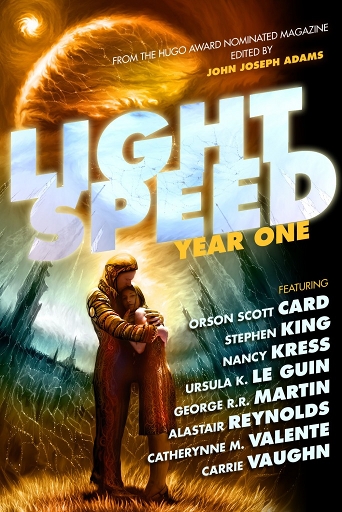 I also went through a phase where I was creating these plot diagrams for different books and movies. I would create a chart with usually three or four columns, and each scene would be assigned to one or more of the columns. I found that most Hollywood movies could be broken down into three plotlines. So I’d have blue for the “action plot” (the heroes search for the treasure), green for the “character plot” (the heroes go from not trusting each other to being good friends), and red for the “bad guy plot” (the villains cook up schemes to ensnare the heroes). The most complicated movie I looked at was The Talented Mr. Ripley, in which Tom’s relationships with two or three of the major characters are basically subplots in their own right. One really useful thing I did was draw up and compare charts for ENDER’S GAME the short story versus ENDER’S GAME the novel. The short story has one straightforward plotline. In order to expand it into a novel, Card picks up this plotline much earlier in the story, while Ender is still living with his parents, and also adds a number of subplots. It was a good way for me to visualize some of the differences between a short story structure versus a novel structure. Unfortunately I inadvertently lost all those charts during an overhaul of my website.
I also went through a phase where I was creating these plot diagrams for different books and movies. I would create a chart with usually three or four columns, and each scene would be assigned to one or more of the columns. I found that most Hollywood movies could be broken down into three plotlines. So I’d have blue for the “action plot” (the heroes search for the treasure), green for the “character plot” (the heroes go from not trusting each other to being good friends), and red for the “bad guy plot” (the villains cook up schemes to ensnare the heroes). The most complicated movie I looked at was The Talented Mr. Ripley, in which Tom’s relationships with two or three of the major characters are basically subplots in their own right. One really useful thing I did was draw up and compare charts for ENDER’S GAME the short story versus ENDER’S GAME the novel. The short story has one straightforward plotline. In order to expand it into a novel, Card picks up this plotline much earlier in the story, while Ender is still living with his parents, and also adds a number of subplots. It was a good way for me to visualize some of the differences between a short story structure versus a novel structure. Unfortunately I inadvertently lost all those charts during an overhaul of my website.
But yeah, I’m a very analytical person and a very analytical writer. I like to think things through and puzzle things out. I have writer friends who tell me that I’m doing it all wrong, that you just have to turn off the analytical part of your brain when you’re writing, otherwise you’ll never write anything. There’s probably something to that. I’d probably be a lot more prolific if I stopped overthinking everything. It’s getting a little ridiculous. I’ll watch Star Wars and think, “If this is a long time ago in a galaxy far, far away, how can there be human-looking characters? The human form is a unique product of our specific evolutionary history.” When you’re analyzing everything that rigorously, it’s hard to find anything that passes muster, so I should probably just chill out. But basically that’s who I am. I don’t think I’d enjoy being a completely intuitive writer, where words just flowed out of me and I didn’t think too hard about where they were coming from or what they meant or what made them work. It’s thinking things through and understanding how stories work on a structural level that’s the fun part for me.
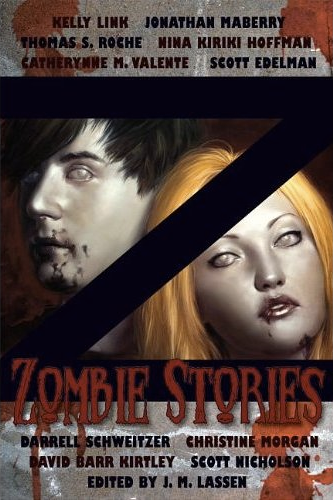 You also draw and have an account on DeviantArt. When did you start cultivating this talent? Which media do you prefer? Do you always draw pictures related to your writing?
You also draw and have an account on DeviantArt. When did you start cultivating this talent? Which media do you prefer? Do you always draw pictures related to your writing?
I’ve been drawing since before I can remember. I was always the best in my school at drawing, up until high school. My senior year of high school this kid moved to our school who was doing some work for a comic book company, and he was actually better than me, and that was a real shock, that someone my age could draw better than I could. I never developed that talent though, never took any classes, never got any better than I was in high school, never experimented with any medium besides Bic pen on notebook paper. Drawing was mostly something I did to occupy my time during boring classes. I haven’t done it much since I finished school. Most of the stuff I tossed up on deviantArt is culled from old school notebooks. Also, a few years ago I got an electronic pen and sketchpad that you plug into the computer. I experimented with that for a few days, but started having technical problems almost immediately. But the color images of mine on deviantArt are things that I messed around with during the first few days of owning that device.
I also do sketches sometimes to help me think through story ideas. For example, I was trying to come up with an idea for a zombie anthology, so I started drawing zombies, and one I drew was dressed in a military uniform and leading a zombie army, and that led directly to my story, THE SKULL-FACED BOY. It also helps a lot sometimes to sketch a character’s face, because I think you have a much better sense of a person if you can look them in the eye.
Through DeviantArt you invite fans to illustrate your stories and feature their pictures on your blog. What picture inspired you to first do this, and how have you enjoyed seeing others’ interpretations of your work?
The story I mentioned above, THE SKULL-FACED BOY, was reprinted in the John Joseph Adams anthology THE LIVING DEAD in 2008. That book came out just as zombies were exploding in popularity, and before the market was completely saturated, and it did amazingly well, selling over 100,000 copies. That was an unprecedented level of exposure for me, and suddenly my story was being talked about all over the place, and John and I were traveling around speaking about zombies to all sorts of fan groups around New York.
So then one morning I turn on my computer and check my mail. This is before I’ve put my contacts in, so I have one eye practically pressed to the monitor, and I open one message and the whole screen fills with a picture of this zombie army, and I’m just like, “What the heck?” So I go and put my contacts in and take another look, and discover that an artist named Jandan has sent me my first-ever piece of fan art, this really cool, giant picture of the skull-faced boy leading his zombie army out of the remains of a burning city, and I was just amazed that someone had done that. Later she also drew some of the characters from my story CATS IN VICTORY.
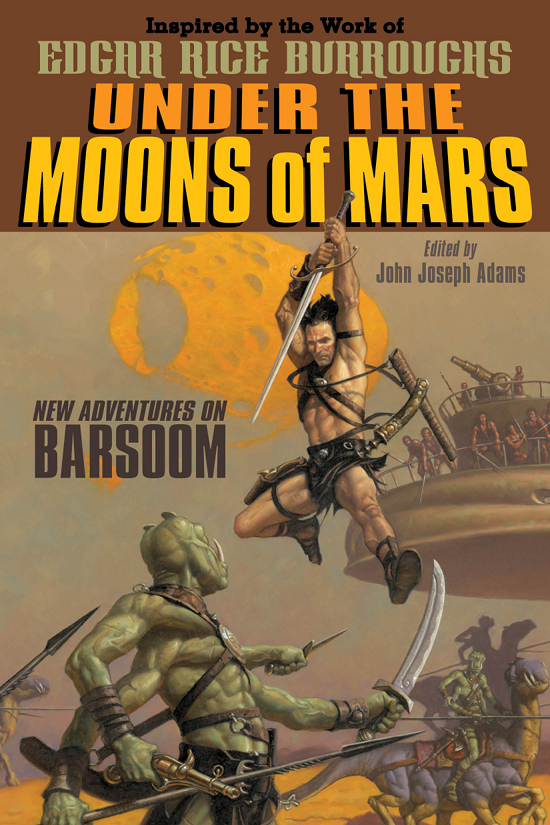 And I got a bunch more SKULL-FACED BOY fan art from different people, and I got permission from the artists and posted it all on my blog. Then I got the idea to post an entry saying, “Hey, if anyone else does fan art for my stories, let me know and I’ll post it on my blog, and do my best to promote you.” So far that hasn’t netted me any additional fan art, but I remain optimistic. It makes sense to me that people might want to do that. I mean, I’ll browse deviantArt and there are seven billion pieces of fan art for STAR WARS or whatever, and it’s not as if George Lucas is ever going to know or care about any of it. But if you do some amazing fan art for an up-and-coming writer, you could really make someone’s day, and probably make yourself a friend for life.
And I got a bunch more SKULL-FACED BOY fan art from different people, and I got permission from the artists and posted it all on my blog. Then I got the idea to post an entry saying, “Hey, if anyone else does fan art for my stories, let me know and I’ll post it on my blog, and do my best to promote you.” So far that hasn’t netted me any additional fan art, but I remain optimistic. It makes sense to me that people might want to do that. I mean, I’ll browse deviantArt and there are seven billion pieces of fan art for STAR WARS or whatever, and it’s not as if George Lucas is ever going to know or care about any of it. But if you do some amazing fan art for an up-and-coming writer, you could really make someone’s day, and probably make yourself a friend for life.
But yeah, it’s amazing to see something you dreamed up get illustrated by someone else, and to get a glimpse into how they saw your story. Not just with fan art but with professional art too. Some of the art that was done for Realms of Fantasy had a strong Asian influence, which brought a completely different perspective to the stories. There was also a really great illustration for my story RED ROAD, which is about talking, sword-wielding mice, and the mice in that picture are a lot cuter than I’d imagined them, so that was definitely a different interpretation, but it totally works.
For my birthday a few years ago my parents paid to have a young comic book artist named Michael DiMotta do an illustration for my story FAMILY TREE, and that piece is now framed and hanging on my wall. The story is about a family of feuding wizards who live in a giant magical treehouse, so the picture shows the two sides of this family facing off, with this giant tree in the background. The tree is a lot bigger than I’d imagined it, and the magic is a lot more visually dramatic, but again, that’s cool, seeing someone else’s vision of it. All this art is up on my website, by the way.
Can you give us a preview of your next short story coming out?
I have two stories coming out this spring, both of which I wrote for John Joseph Adams.
The first is called THREE DEATHS, and it’ll be appearing in UNDER THE MOONS OF MARS: NEW ADVENTURES ON BARSOOM published by Simon & Schuster. It’s all stories set in the same mileu as Disney’s new JOHN CARTER movie, which is based on the work of Edgar Rice Burroughs, creator of Tarzan. In his Mars books, which were written before people really knew anything about Mars, Burroughs presents an exotic landscape full of grotesque monsters and deserted cities. My story is about a four-armed Green Martian, Ghar Han, who loses two of his arms in a duel with John Carter.
The other story is called POWER ARMOR: A LOVE STORY, and it’s about an inventor from an Orwellian future who steals a suit of invincible power armor and escapes into the past. But the regime from which he’s fled has sent an assassin after him, so he never, ever takes off the armor, because if he did then this assassin might strike. It’s sort of a romantic comedy/dark comedy, and will be appearing in the anthology ARMORED from Baen.
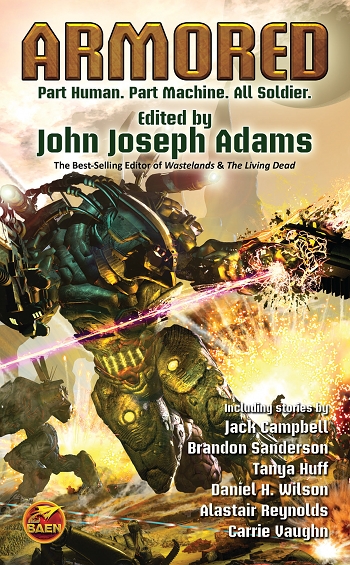 How about of an upcoming episode of Geek’s Guide?
How about of an upcoming episode of Geek’s Guide?
We don’t really make plans beyond the current episode, mostly because we’re just not that organized, but I could talk about our most recent show, in which we interviewed Chuck Palahniuk, author of FIGHT CLUB. We figured he was geeky enough since he recently appeared at the Clarion West science fiction writers workshop, and a number of his recent books have had a fantasy/science fiction slant. For example, his most recent book, Damned, is about a teenage girl who dies and goes to Hell. His vision of Hell has some of the standard elements, cages and torture and waterfalls of blood and so on, but also there’s telemarketing, and nonstop showings of THE ENGLISH PATIENT, and you can bribe the demons with candy. He also talked about a bunch of his short stories, and told some of his favorite anecdotes. Then for the discussion we talk about the devil and hell in fantasy & science fiction, and we brought in our friend Grady Hendrix, author of the new novel SATAN LOVES YOU. He was also one of the organizers of the New York Asian Film Festival, where they screen some of the most shocking and repulsive films ever made, and he’s just a really witty, exuberant character, so that was probably one of the rowdiest discussions we’ve had, and it was a bit of a challenge when editing it to bring some level of focus and coherence to it, but I think people will really get a kick out of it.
Have you got any upcoming workshop or con appearances you’d like to tell us about?
The only thing I’m doing for sure is teaching at Alpha again this summer. If you or someone you know is ages 14-19 and interested in writing fantasy & science fiction, you should look into it. It’s a great way for students to make friends who share their interests. I really wish something like it had existed when I was that age. This year bestselling author Tamora Pierce will be hanging out with us for the whole workshop, which is pretty exciting.
The other thing I’d mention is that folks should definitely check out my website at davidbarrkirtley.com. I recently posted a bunch of my older stories there, so now most of my published fiction is available for free online.
Thanks for speaking with me.
And many, many thanks to Dave for this interview! In it are surely a few facts that you never even suspected about podcast host, David Barr Kirtley.
-Emily
.
I hope Geeks Guide leaving Io9 doesnt end up killing off the show.
Actually, there’s no official word on that one way or the other, yet, but Dave said he’d let me know once there is.
[…] Mah Tippets interviews me about writing and podcasting for Black Gate […]
[…] Black Gate (Emily Mah) interviews David Barr Kirtley. […]